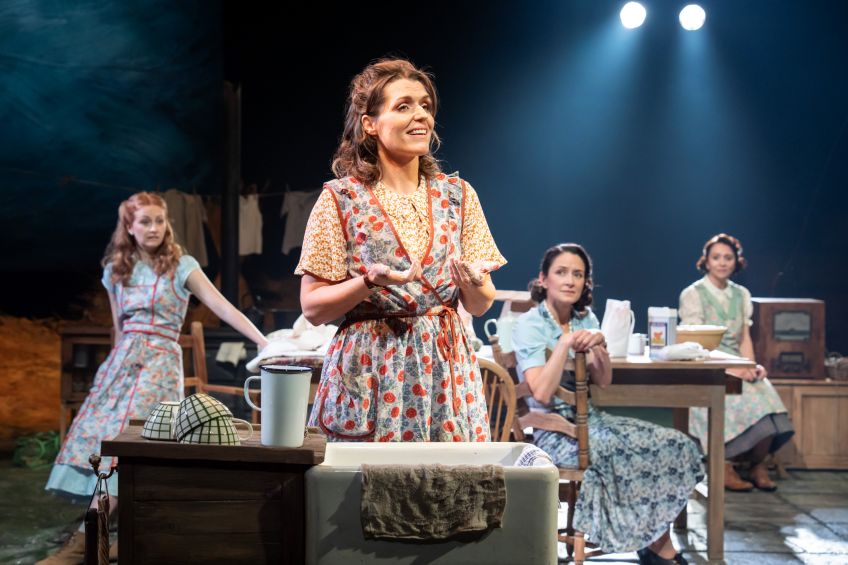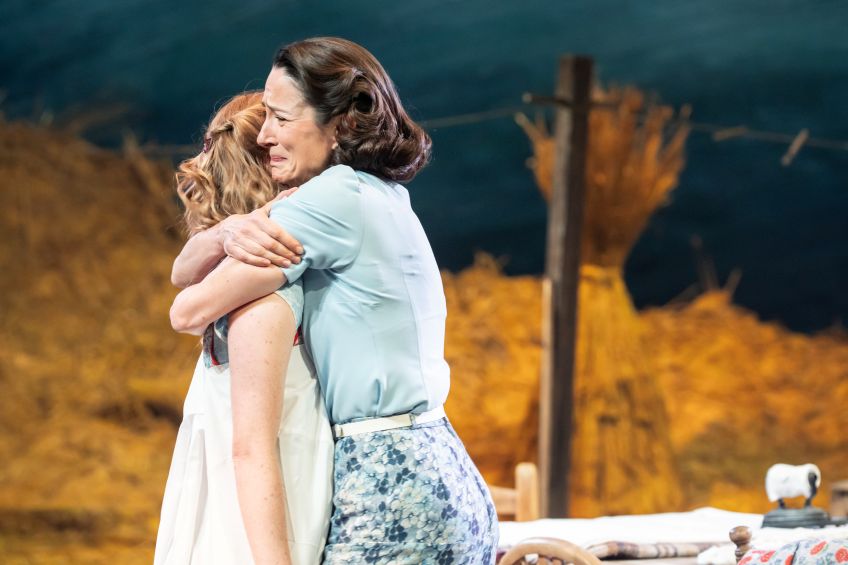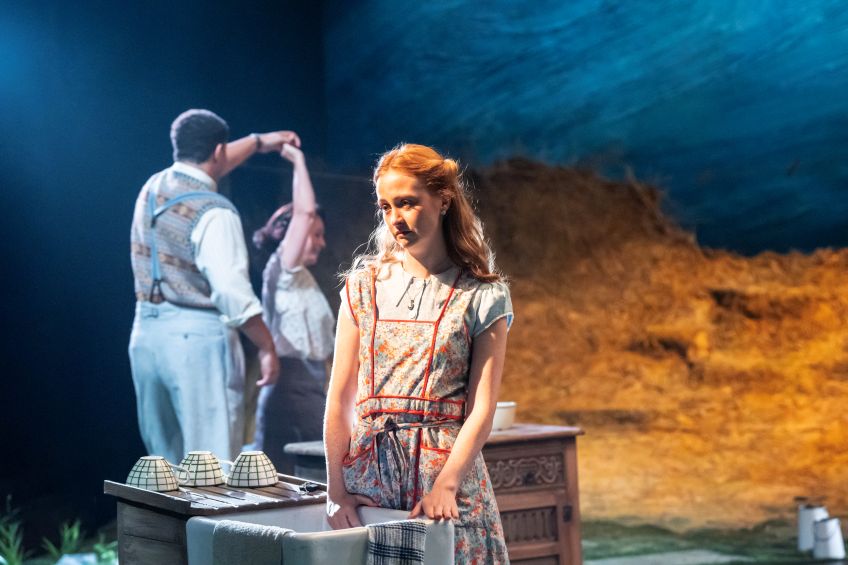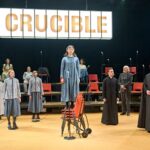Under Elizabeth Newman’s direction, Dancing At Lughnasa is brought to the Crucible stage in a beautiful drama that’s engagingly real and powerfully, tenderly moving.
Written in 1990 (with a Meryl Streep film version in 1998), Brian Friel’s multi-award-winning play is set in the summer of 1936 in fictional, rural Ballybeg, County Donegal, Ireland. Narrated through the eyes and memory of a now adult Michael, the illegitimate son of the youngest of five impoverished Mundy sisters, the drama unfolds at their home as he looks back over their lives and his childhood. Rural 1930’s Donegal life is masterfully, magically evoked by a stunningly atmospheric set, unchanged throughout and subtly lit, by fine costume and music choices and by superb performances from the women. The story to some extent is Friel’s own, for his mother grew up in Glenties, Donegal, with her four sisters and their older, priest/missionary brother. Friel, like Michael, was seven years old in 1936, a time of great change and challenge.
With wild dancing at the heart of it, Lughnasadh is a Gaelic harvest festival in August that pays tribute to the god Lugh, a time for parties and dance, fun and excitement and maybe a spot of romance as ceremonies and rituals celebrate the fruitfulness of the earth. These wild beliefs and unacceptable pagan rituals are completely at odds with the faith of Catholic Ireland, of course, but the allure of dance is universal for it brings moments of freedom and wild abandon and of romance and dreams. Dance, like music, can go deeper than words in a nostalgic instant, the merest snatch whisking us off to another time and place entirely. With bursts of Irish fiddle, a smoochy Dancing in the Dark and Anything Goes, the play’s music conjures up the feel of the era splendidly and gives insight into the yearnings in the women’s constrained, repressed lives. The gentle swaying with which the piece ends is particularly touching.

As the summer’s events unfold Michael’s mother and aunts burst vibrantly to life onstage, each a distinct, individual personality, as dynamic relationships play out brilliantly between them, full of nuance and complexity. The women evoke a wonderful sense of the deep love that exists between them in spite of their various frictions and differences as emotions roller-coast from love, joy, humour and romance to heartbreak, frustrated hopes, despair and tragedy. A lack of money, harsh daily practicalities, unsuitable romances, religious faith and uncontrollable lurches in fortune in a fast-changing society and fast-changing wider world have them battling for survival and lead ultimately to the breakup of the family.
Natalie Radmall-Quirke’s Kate takes on a responsible, motherly role, keeping her sisters in check and earning a good wage as a schoolteacher for them all to live on (until her job is under threat). Staid, stiff and restrained, she dresses more smartly and tries hard to set a good Catholic example. Radmall-Quirke’s fine portrayal ensures, though, that for all that, we also see another side of Kate, a side that, deep down, yearns just like the others for romance, freedom and wild self-expression. She dutifully, stoically refuses to condone her sisters’ behaviour as they dance, wild and rebellious, round the kitchen in their boots and wrap-around pinnies, breaking free from their confined lives for a brief moment to let off emotional steam amidst frenzied showers of flying flour; in the end, though, she can’t resist loosening her blouse and joining them.
Full of live-wire vibrancy, Siobhan O’Kelly hits the spot magnificently as the more laid-back, earthy Maggie, ever ready with jokes, riddles and witty quips to help diffuse tensions and lighten life’s heavy burdens and she also has a constant, comic craving to light up Woodbines. Warm and loveable, too, is Rachel O’Connor’s Rose; her mental age and capacity for naivety may belie her actual age, causing concern for her loving sisters, but O’Connell’s Rose is a well-rounded, thoughtful character, full of fun and life and far from simply simple. Laura Pyper’s Agnes, quietly frustrated and anxious, is the one who primarily takes Rose under her wings as together the two keep house and knit gloves (until a glove factory opens). Unhappy fates await them both. Martha Dunlea conveys gently and sensitively the ongoing dream and longing of Michael’s mother, Christina, that Michael’s elusive, secretly philandering father, Gerry (played a tad ponderous by Marcus Rutherford with a non-specific accent as Friel wished it to be) really will marry her one day instead of just dropping by once in a blue moon to make more empty promises before disappearing again, leaving her once more with dashed hopes and depression.

Interacting with the sisters is Frank Lavery’s very real Jack, the older brother who left as a Catholic priest and, after time in the army, spent 25 years speaking Swahili and working amongst lepers in Uganda, not so much converting them as being drawn towards their beliefs and way of life, also full of dancing. Laverty’s shuffling, stooped body and bewildered, confused, distracted pauses convey spot-on his ill health both in body and mind but he gradually develops more lucid, happy moments to the relief of his worried sisters as his English vocabulary reboots. Relishing, like Friel, the sound and meaning of words, he even imparts words of wisdom in bursts of happy nostalgia though his new views on life make him an outcast in a Catholic society.
Interacting with no-one at all is Kwaku Fortune’s adult Michael. From different locations around the stage he clearly, engagingly narrates events, past and future in a detached, factual, unemotional way. The seven-year-old Michael is an invisible entity, but Fortune does speak occasional lines for him, maintaining though, his grown-up, dispassionate narrator’s intonations rather than adopting more child-like tones (which is, perhaps, a shame.)
Francis O’Connor’s set is beautifully pleasing, taking us straight to time and place. At the back, like a Vlaminck canvas, is a bold, vibrant, dark sky of heavy, swirling brushstrokes. In front, irregular, sloping hayfields and straw stacks lead down past a line of washing to a home surrounded by garden. Atop a grey, stone floor of irregular shapes sit wooden chairs, table and cupboards, deep white sink and big stove with smoking chimney. Buckets, crockery and wicker baskets are dotted about and in pride of place sits a big, wooden wireless set, the Marconi, whose erratic, infrequent bursts of music stop problems in their tracks as the joy and ecstasy of dance takes over, albeit but briefly – for such is their life. Outside in the rocks, grass and weeds sit little Michael’s kites, while all the time overhead at a jaunty angle, tilted slightly from horizontal, shines a spectacularly massive, sunny orange harvest moon, resembling a handsome, upturned, round circus plinth as once used for lions and elephants to climb on.
Full of history, humanity, charm, thought-provoking questions and philosophical musings this is a delightful, touchingly intimate play from ’the Irish Chekhov‘, full, too, of character and, for the most part, superbly performed.
Eileen Caiger Gray




